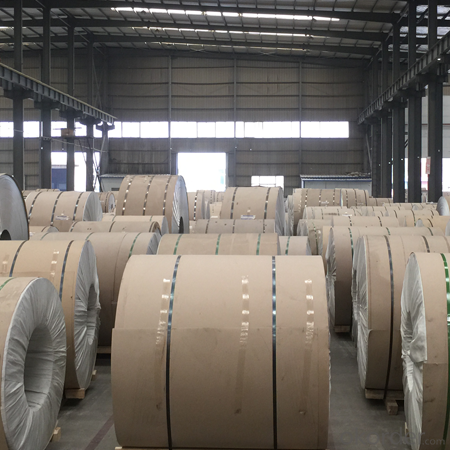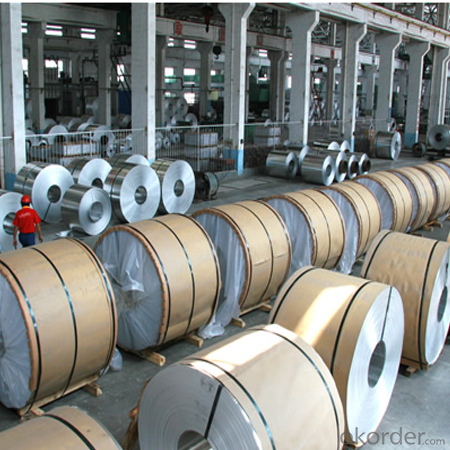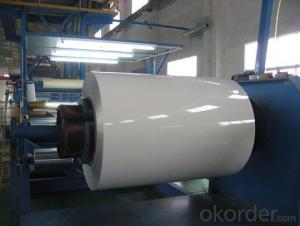Coated Aluminium Coil/Roll For Aluminium Honeycomb Panel
- Loading Port:
- Shanghai
- Payment Terms:
- TT OR LC
- Min Order Qty:
- 2 m.t.
- Supply Capability:
- 50000 m.t./month
OKorder Service Pledge
OKorder Financial Service
You Might Also Like
Item specifice
Coated Aluminium Coil/Roll For Aluminium Honeycomb Panel
Description
Alloy | 1060, 1100, 3003, 8011, etc. |
Temper | H16, H18, H24, H26, H28 |
Thickness | From 0.05mm to 3.0mm |
Width | Standard width:1240mm |
Special width:1300mm, 1520mm, 1570mm, 1595mm | |
Diameter | Standard dia:1200mm |
Interior dia:150mm,405mm,505mm | |
Weight | 2.5 T/coil,3.0 T/coil |
Coating | PE, PVDF, ACRYLIC |
Surface | Embossed, mill finish, coated |
Color | AS to code RAL |
Gloss | 10-90%(EN ISO-2813:1994) |
Coating Thickness | PE: more than 18 micron |
PVDF: more than 25 micron | |
Coating Hardness(pencil resistance) | More than 2h |
Coating adhesion | 5J (EN ISO-2409:1994) |
Impact Resistance | No peeling or cracking(50 kg/cm,ASTMD-2794:1993) |
Flexibility(T-bend) | 2T |
MEK resistance | More than 100 |
Advantage | 1.High temperature resistant 2.Weathering resistant 3.Scrubbing resistant 5.Acid or alkali proof 6. Fireproof 7.Light weight material is easy to construct and install |
Out package | Wooden splint with export standard |
Application | ACP, wall cladding, facades, roofs and canopies, ceilings, signboards, blind window, display platforms, electrical panels, etc |


Manufacturing
Decoiler → Accumulator →Tension Leveler →Acid & Alkali Cleaner → Rinse →Conversion Treatment → Priming coater →Infrared Curing Oven →Main coater →Floatation Curing Oven →Strippable Film Applicator → Exit Accumulator → Recoiler
FAQ
--Q: Do you provide free samples?
--A: Yes, free samples will be sent to you on freight at destination.
--Q: Can I get your latest products catalogue?
--A: Yes, it will be sent to you in no time.
--Q: What is the MOQ?
--A: 2 tons
--Q: What are your payment terms?
--A: We accept L/C, T/T.
--Q: What kinds of alloy can you supply?
--A: 1000 series: 1050, 1060, 1070, 1100, 1145, 1200
3000 series: 3003, 3004, 3105, 3104
5000 series: 5052, 5083, 5754, 5182
6000 series: 6061, 6063, 6062, 6063
8000 series: 8011, 8021
--Q: What kinds of temper can you supply?
--A: O-H112: O,H12,H14,H16,H18,H22,H24,H26,H,32,H34,H111,H112
T3, T4, T6
- Q:Can aluminum coils be used in the production of cans?
- Indeed, the utilization of aluminum coils is applicable in the manufacturing of cans. This versatile material, known for its exceptional attributes like its lightweight nature, durability, and ability to resist corrosion, finds extensive employment in the can-making industry. Typically, during the production procedure, aluminum coils are shaped into sheets and subsequently trimmed to achieve the desired dimensions and contours of the can. These sheets are then treated with coatings, printed upon, and processed into cans using a variety of techniques. Employing aluminum coils guarantees the creation of first-rate cans that are well-suited for packaging a wide range of beverages and food items.
- Q:For an intake manifold on a car, as far as increasing the inlet air temperature which is better steel or aluminum? Assuming the cylinder heads are aluminum, and half the thickness of steel is used versus aluminum. I know that steel has a lower heat capacity than aluminum, so does this mean even in this case the steel will heat up quicker and disperse the heat into the inlet air more than aluminum? Basically which material will keep the inlet air as low as possible. I know certain plastics are better than both, but I'm just curious about these two metals. Thank you.
- Increasing heat temperature (Highest point) must be less than melting point of the Aluminum (1221 degree Fahrenheit).Now factor of the weight and stabilizing is important to choose the metal in that section .Aluminum is like fire cricket during melting and if be in flounce of the over heating my cause lot of damages .
- Q:I am wondering if a deodorant made with aluminum silicate is safer than one with aluminum salt.
- aluminum silicates have been used in deodorants for years. there was a time when it was thought that the Al in the deodorants was causing alzheimers but that has been shown to be wrong. if there are other dangers to the silicates, we haven't found them or they aren't that bad
- Q:Can aluminum coils be used in low-friction applications?
- Yes, aluminum coils can be used in low-friction applications. Aluminum's low coefficient of friction and excellent thermal conductivity make it a suitable material for various applications where low friction is desired, such as in sliding mechanisms, bearings, and electrical connectors.
- Q:What are the benefits of using aluminum coils?
- There are several benefits of using aluminum coils in various applications. Firstly, aluminum coils are lightweight, making them easier to handle and transport. This is particularly advantageous in industries such as automotive and aerospace, where weight reduction is crucial for fuel efficiency and overall performance. Additionally, the lightweight nature of aluminum coils allows for easier installation and maintenance. Secondly, aluminum has excellent corrosion resistance properties. Unlike other metals, aluminum does not rust or corrode easily when exposed to moisture or chemicals. This makes it an ideal choice for outdoor applications and environments with high humidity or harsh weather conditions. The corrosion resistance of aluminum coils ensures their longevity and durability, reducing maintenance and replacement costs. Another benefit of using aluminum coils is their high thermal conductivity. Aluminum is an excellent conductor of heat, allowing for efficient heat transfer in various heating and cooling systems. This property makes aluminum coils suitable for applications such as air conditioning, refrigeration, and heat exchangers. The high thermal conductivity of aluminum coils ensures better energy efficiency and improved performance of these systems. Furthermore, aluminum is a highly recyclable material. Using aluminum coils promotes sustainability and reduces environmental impact. Aluminum can be recycled repeatedly without losing its quality or properties, making it a cost-effective and eco-friendly choice. By using aluminum coils, businesses can contribute to the circular economy and minimize their carbon footprint. In summary, the benefits of using aluminum coils include their lightweight nature, corrosion resistance, high thermal conductivity, and recyclability. These advantages make aluminum coils a versatile and cost-effective solution for various industries, enhancing performance, efficiency, and sustainability.
- Q:Some makes like KIA make a point of having aluminum engines. I thought this was for weight, but was more prone to failure, especially in a high mileage car.
- aluminum is a very flexible and heat intolerant metal. It is used to save weight....period. Normal use is fine but more frequent cooling system maintenance is required. Never overheat an aluminum engine as you'll let the magic smoke out when it warps every piece in it
- Q:How are aluminum coils joined together to form larger panels?
- Aluminum coils are joined together to form larger panels through a process called coil coating or coil joining. In this process, the edges of the coils are aligned and then welded, soldered, or bonded together using specialized techniques and adhesives. This ensures a strong and seamless connection between the coils, resulting in a larger aluminum panel.
- Q:Difference between aluminium roll gate and iron roll gate
- Structurally, there is no difference, but the aluminum roll gate weight is light, the motor needs little effect, save power; and the iron roll gate weight, motor power, electricity, but the door of high strength, better safety performance.
- Q:is there any kind of solder or technique that can solder copper to aluminium? or is it just not possible!?
- Conventional tin/lead alloys cannot be used to solder aluminium to anything: it's just not possible.
- Q:How do aluminum coils contribute to energy-efficient lighting installations?
- The energy efficiency of lighting installations is greatly enhanced by the use of aluminum coils. Firstly, aluminum, being highly conductive, effectively transfers heat away from the lighting system. This prevents heat accumulation, which can negatively impact the performance and lifespan of the lighting fixtures. By effectively dissipating heat, aluminum coils ensure that the lights operate at their highest efficiency by maintaining optimal operating temperatures. Furthermore, aluminum coils are lightweight, which makes them easier to handle and install. This reduces the overall weight of the lighting fixtures, making them more convenient to mount and manipulate during installation. The reduced weight also leads to lower energy consumption during transportation and installation, thus promoting long-term energy efficiency. Additionally, aluminum coils are highly durable and resistant to corrosion, making them ideal for lighting installations exposed to various environmental conditions. This durability reduces the need for frequent replacements or repairs, resulting in lower energy consumption associated with maintenance. Moreover, aluminum is a recyclable material, meaning that the coils can be easily reused or repurposed at the end of their life cycle. Recycling aluminum requires significantly less energy compared to producing new aluminum, leading to a reduced carbon footprint and overall lower energy consumption. In summary, aluminum coils offer numerous benefits in terms of energy efficiency for lighting installations. Their efficient heat dissipation, lightweight nature, durability, and recyclability contribute to optimized performance, reduced energy consumption, and a more sustainable lighting solution.
1. Manufacturer Overview |
|
|---|---|
| Location | |
| Year Established | |
| Annual Output Value | |
| Main Markets | |
| Company Certifications | |
2. Manufacturer Certificates |
|
|---|---|
| a) Certification Name | |
| Range | |
| Reference | |
| Validity Period | |
3. Manufacturer Capability |
|
|---|---|
| a)Trade Capacity | |
| Nearest Port | |
| Export Percentage | |
| No.of Employees in Trade Department | |
| Language Spoken: | |
| b)Factory Information | |
| Factory Size: | |
| No. of Production Lines | |
| Contract Manufacturing | |
| Product Price Range | |
Send your message to us
Coated Aluminium Coil/Roll For Aluminium Honeycomb Panel
- Loading Port:
- Shanghai
- Payment Terms:
- TT OR LC
- Min Order Qty:
- 2 m.t.
- Supply Capability:
- 50000 m.t./month
OKorder Service Pledge
OKorder Financial Service
Similar products
New products
Hot products
Related keywords





























